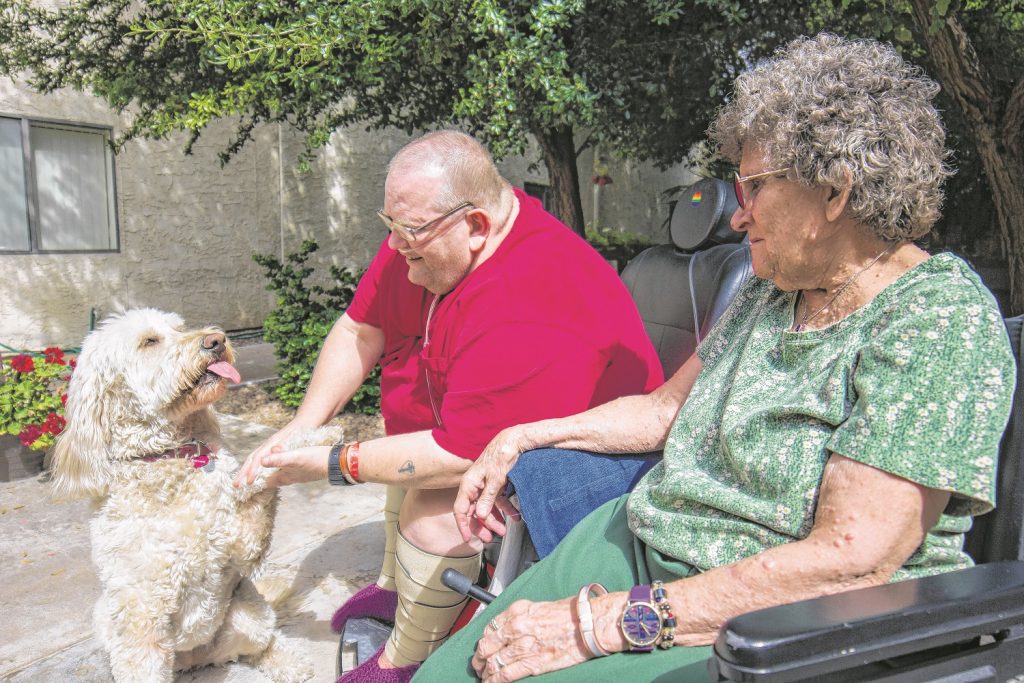
By Deborah Hilcove
Bath? Check. Ears cleaned? Check. Teeth brushed? Check. Then it’s time to buckle on the uniform vest and head off to work.
This is pretty much an ongoing routine for Lucy, one of the therapy dogs at Westchester Care Center in south Tempe.
The regimen is much the same as it is with any therapy dog. Unlike service dogs that are specifically trained to assist one disabled person, therapy dogs work with many people. They appear in hospitals, assisted-living and hospice centers, as well as in domestic violence shelters, foster homes, accommodations for the homeless and schools. They provide comfort and support, helping to lower stress and blood pressure. They especially help people affected by violence or by natural disasters, such as hurricanes or fire.
At Westchester, Lucy’s main job is to help alleviate loneliness.
Some therapy dogs work with physical, speech or occupational therapists in animal-assisted therapy. For example, they might work with a stroke victim, helping him to walk again, or with a traumatic brain injury victim, helping her learn to speak again by giving commands such as “sit” or “stay.”
In senior care centers like Westchester, these dogs visit residents and have been shown to elevate moods and increase social interaction, speech and activity.
At Westchester Care Center, residents eagerly await the arrival of Lucy, accompanied by her handler and staff member Colleen Carosello. Lucy, a cream-colored goldendoodle, is well-suited to being a therapy dog. She has the tight, curly coat of a poodle, so she doesn’t shed, and the calm, happy demeanor of a golden retriever.
Once she arrives, Lucy goes right to work. She greets John, wagging her tail furiously and, with John’s permission, plants doggy kisses.
Carosello holds the leash while John encourages Lucy to come close to the wheelchair and give him a hug. “Sometimes,” Carosello says, “John likes to put bacon treats on his head and ask Lucy to get the treat. They’re good pals.”
Kathy Little, a medical staffer, walks by during rounds and stops to pet Lucy. “Hi, pretty girl. Best visitor on earth.”
“We’re on our way to visit Mary,” Carosello tells her. “One of Lucy’s faves.”
After lots of loving from Mary, Lucy visits Larry, who has limited movement of his arms and hands. He’s resting in bed and invites Lucy to play. Carosello places a large, soft ball on Larry’s chest and he bats it across the room. Lucy scrambles after it and gently places the ball on Larry’s chest again, eagerly waiting for the game to continue.
Another medical staffer, Melissa Brodsly, spies Lucy across the hallway and the two engage in a rambunctious game of peek-a-boo, with Lucy bounding over to her.
“Lucy’s great,” says Deborah Wahl, activities director at Westchester. “She intuitively knows when she can stand up and ‘hug’ someone and when she can play. She knows when to be gentle and just give comfort.”
Lucy next visits Marie. Lucy sits quietly, letting Marie rub her ears and pat her head. “I had a dog. GI-Joe. A Shih Tzu,” she says softly. Carosello nods. “Lucy brings back good memories for our residents. Especially if they grew up with a dog.”
Laurie Schmidt, a nurse manager, looks up from her desk, gives Lucy a good scratch behind the ears.
“Great dog. I love her bad. Reminds me, I have to give you paperwork for my four-month old, Gibbs. He’s about ready to start coming in to visit.”
“We have five therapy dogs that visit,” Wahl explains. “They have to be current on their shots and cleared by a vet. We have an Australian shepherd, two mixed breeds, and a springer spaniel, Blake. He’s a certified therapy dog. We’re always happy to talk to volunteers who think their dog might be a good therapy candidate.”
For more information, contact Deborah Wahl at Westchester Care Center, 6100 S. Rural Road, Tempe, 480-831-8660.

